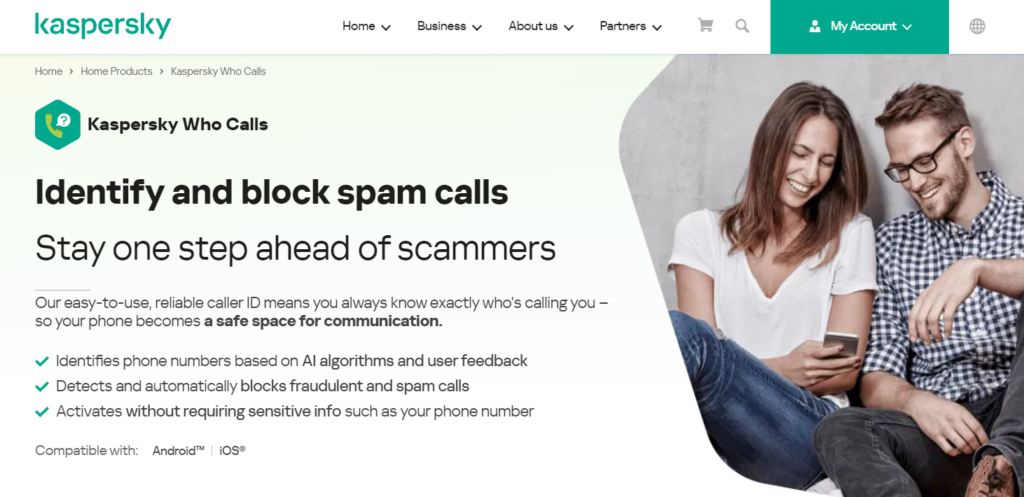

Unknown Caller: What Does It Mean and Should You Answer the Call

Mysterious calls from the infamous “Unknown Caller” seem to have become a regular occurrence in our modern lives. It can be nerve-wracking not knowing who’s on the other end. Is it a friend, an opportunity, or a scammer? In this article, we’ll explore the potential risks and possible rewards of answering unknown calls and help you figure out whether you actually should pick up or not.
What does “Unknown Caller” mean?
Your mobile phone displays this message because your phone manufacturer couldn’t identify the incoming call number. There are various reasons for this. The caller may have subscribed to a service that allows them to hide their phone number. Also, certain phone settings enable you to easily hide your number when making a call.
Should you answer the phone calls from “Unknown Caller”?
Now, the big question on your mind: should you answer phone calls from “Unknown Caller,” and are they safe? Well, the answer isn’t black and white. While some unknown calls may be harmless, others could potentially pose risks. Let’s break it down for you.
Legitimate reasons
There are legitimate scenarios where an incoming call may appear as an unknown number. It could be a doctor’s office, a delivery service, or even someone calling from abroad. So, there’s a chance it could be an important call that you don’t want to miss.
Scam risks
On the flip side, some unknown calls may originate from scammers or telemarketers trying to deceive or defraud you. These individuals may use various tactics to trick you into providing personal information or fall for fraudulent schemes.
Trust your instincts
If something feels off about the call, such as aggressive sales pitches, requests for sensitive information, or offers that seem too good to be true, it’s best to proceed with caution.
Consider caller ID services
One way to gain more information about incoming calls is to utilize caller ID services or apps. These services can help identify spam or potential scam calls by cross-referencing the number against their databases.
Your privacy matters
Remember, you have the right to protect your privacy. If you prefer not to answer unknown calls, it’s completely understandable. You can always let them go to voicemail and decide whether to respond after you’ve assessed the situation.
Ultimately, the decision to answer calls from “Unknown Callers” depends on your level of comfort and the context of the call. Trust your instincts, be cautious of potential scams, and prioritize privacy.
What should I do if I get an unknown call?
So, you’ve received an unknown call, and now you’re wondering what steps to take. Don’t worry, we’ve got you covered! Here’s what you can do if you find yourself in this situation.
- Don’t answer immediately. If you’re unsure about the call, let it go to voicemail or simply ignore it. Scammers often hope for immediate answers, so by not responding right away, you’re already protecting yourself.
- Listen to the voicemail. If the caller leaves a voicemail, listen to it carefully. It might provide valuable information about the purpose of the call or the identity of the caller.
- Conduct a reverse phone lookup. Consider using a reverse phone lookup service or an online search engine to find information about the number. Sometimes, you’ll discover if it’s associated with known scams or spam.
- Avoid sharing personal information. Regardless of the caller’s claims or requests, never share sensitive personal information, such as your Social Security number, bank account details, or passwords, over the phone. Legitimate organizations won’t ask for such information via an unsolicited call.
- Block the number. If you continue receiving unwanted calls from the same number, use your phone’s blocking feature. By blocking the number, you can prevent future calls from reaching you.
- Report suspicious calls. If you suspect the call might be part of a scam or fraudulent activity, report it to the appropriate authorities. In many countries, you can report such incidents to your local law enforcement or the Federal Trade Commission (FTC).
How to detect spam calls?
Detecting spam calls can be a challenging task, but with a few tricks up your sleeve, you can become a savvy caller ID detective. Here are some methods to help you spot those sneaky spam calls:
Caller ID services
Take advantage of caller ID services provided by your phone carrier or consider installing a reliable caller ID app. These tools can automatically identify and flag potential spam calls based on their extensive databases.
Install a specialized mobile app
There are several mobile apps available that can help you detect and mitigate the risks associated with spam calls. Here are a few popular options:

Truecaller is a widely-used app that offers a powerful caller ID and spam call-blocking feature. It has an extensive database of spam numbers and user-reported information, helping you identify and block unwanted calls.
Who calls: Caller ID by Kaspersky

An easy-to-use, reliable caller ID to identify and block spam calls. This app identifies phone numbers based on AI algorithms and user feedback, detects and automatically blocks fraudulent and spam calls, and activates without requiring sensitive info such as your phone number.

GetContact is an app designed specifically to combat robocalls and spam calls. It employs advanced algorithms to detect and block automated spam calls, saving you from the annoyance and potential risks they bring.
Look for common signs
Certain signs often indicate a spam call. Pay attention to calls that come from suspicious or unfamiliar area codes, display vague or generic caller names, or have a robotic or pre-recorded voice.
Research the number
When in doubt, conduct a quick online search for the phone number. Scammers often target multiple people, so if it’s a known scam number, you’ll likely find reports or warnings from others who have encountered it.
Analyze the call pattern
Spam calls often follow specific patterns. If you receive multiple calls from different numbers with similar characteristics, such as the same pre-recorded message or a persistent sales pitch, it’s likely a spam campaign.
Be wary of urgency and threats
Scammers often employ urgency and threats to manipulate you into providing personal information or taking immediate action. Legitimate organizations rarely resort to such tactics, so be cautious if you encounter them during a call.
Remember, no method is foolproof, but by combining these strategies, you can significantly improve your ability to detect and avoid spam calls. Stay vigilant, trust your instincts, and keep those pesky spam callers at bay!
Bottomline
In conclusion, dealing with unknown callers can be a tricky business, but armed with the right knowledge on what does unknown caller mean plus using helpful tools, you can navigate these calls with confidence. Remember to trust your instincts, conduct research when in doubt, and utilize caller ID services or apps to help identify and block spam calls.
While no method is foolproof, staying vigilant and following the provided tips can significantly reduce the risks associated with unknown calls. For more useful insights on dealing with “Spam Risk” phone calls, be sure to check out this article.



